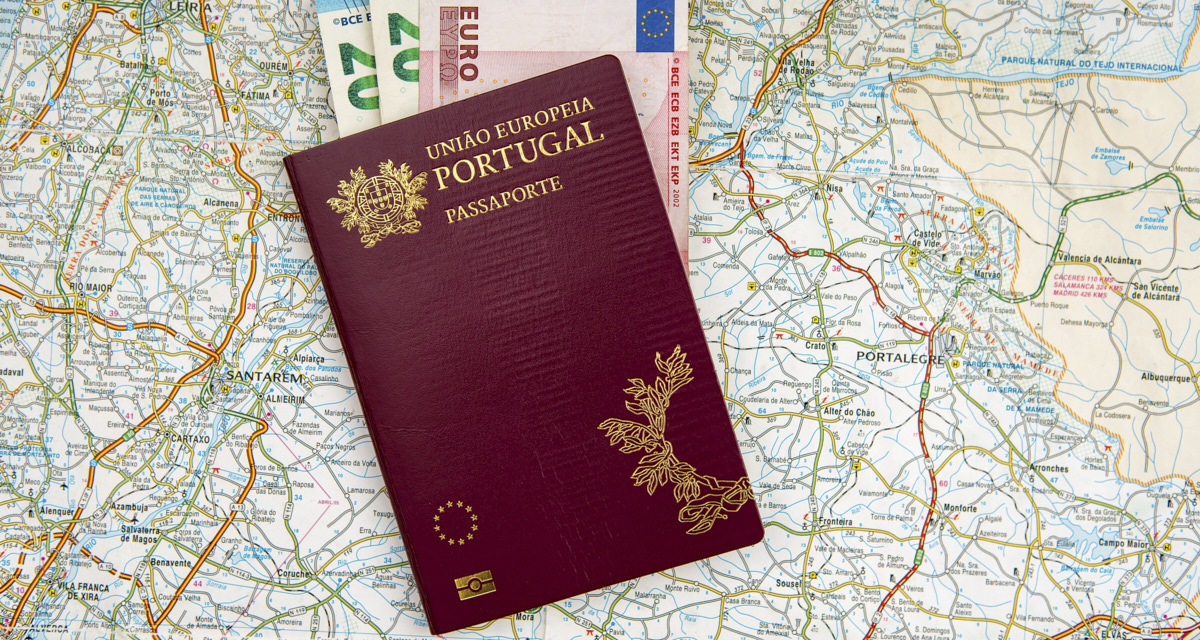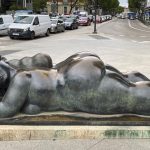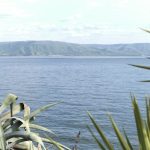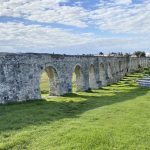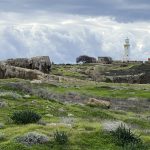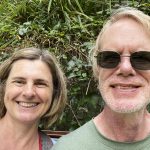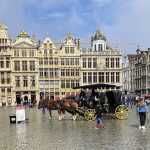There’s been a lot of interest regarding our last post- that we are applying for residency in Portugal. Seems like a big step for a country we’ve only been in a couple of months, right? Well it is a big step, but we’ve been considering it for years, and think it makes a lot of sense for us. Many countries have residency programs, a smaller number have paths to citizenship. And there are a few general types of residency programs as well. The most common one is where a person applies to become a resident of a country, and live there essentially full time. This isn’t too difficult for a US citizen to obtain in many European countries, but you will have to spend the great majority of your time in your new country. And, along with that goes taxes, which are almost always much higher than in the US. (Of course, low cost or free medical care is included, which can make up a lot of the difference) And the quality of health care in Europe is very good, better than the US by most standards. (though there are certainly groups in the US that have their own reasons for trying to say otherwise) We’re not making this decision based on health care, but it is good to know that we will have good access to health care in Europe.
https://www.numbeo.com/health-care/rankings_by_country.jsp
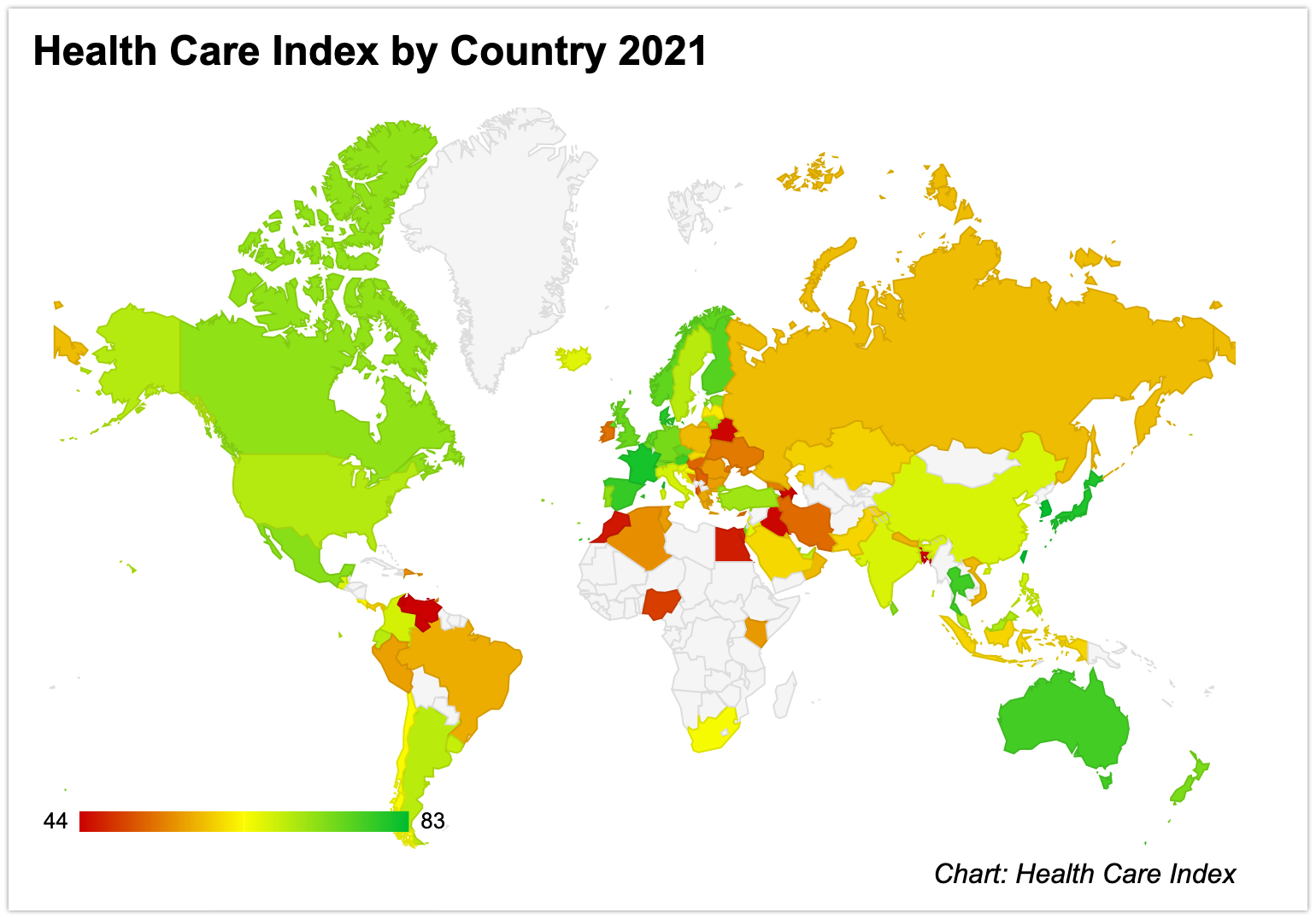
Many countries will encourage immigration by trying to attract skilled workers- doctors, accountants, engineers. New Zealand was trying to encourage barbers according to the fellow that was cutting my hair! Generally, these skills will increase the odds that you can get a residency visa. A residency visa allows one to live in a country, but often must be renewed every year, or every 5 years. A few of these residency programs can lead to citizenship, but many don’t. But for us, a residency program wouldn’t work, since we want to continue wandering, and we’d like to avoid paying higher taxes, above and beyond what we pay in the US. (The US is one of the few countries in the world that will always tax you, regardless of where you live. They do have treaties with many countries, so that you won’t need to double-pay taxes. But you will, essentially, always pay the higher amount of either US or the other country’s taxes.)
A second option is an investment visa. Basically, you make an investment in the country, fill out the paperwork, and obtain residency if approved. Many people will purchase a house as the investment, and either live in it or rent it out. But mutual fund types of investments are also possible in some cases. Some countries don’t ask for an investment, but instead charge a hefty fee. St Kitts and Nevis is one example. Pay your money, and get your citizenship in a few months. These are more common in Caribbean countries. One complaint against these programs is that they are “lower quality”, in that the passport isn’t as widely useful. And some countries are skeptical of these passports, since they can be “purchased”. This means they won’t be as accepting of them, so they might require pre-approval visas before visiting, which might not be necessary with “better” passports.
A number of countries use the visa by investment approach instead, including Portugal, Spain, Greece, Canada, the UK, and even the US. These can vary widely in cost, with the UK, New Zealand and the US being some of the highest. Of course, as an investment, the money will be returned after the residency visa is no longer needed. Some of these residency programs require you to spend a lot of time in the country, some don’t. Many provide residency, but don’t provide any path to citizenship. If they do have a path to citizenship (often after 6 or more years) they may require extensive residency within the country to apply. Which would lead us to having to pay additional taxes, as well as limit our travels…
Bringing us back to Portugal- Portugal has a investment residency program, commonly referred to as a golden visa. Aside from the investment, there are a variety of government and legal fees to be paid. But after 5 years, we will be able to apply for citizenship. The residency requirements are minimal- just a week or two each year. And becoming a “tax resident” isn’t required. What we will have to do is be able to speak Portuguese, which is why we are keeping busy learning a new language. So now we can both honestly say:
Falo um pouco de português, or “I speak a little of Portuguese” . (muito pouco, very little!)
But we’re making progress.
So far, we’ve chosen a company to handle the application and legal details. We’ve opened a bank account in Portugal, transferred the money, and put it in a special type of mutual fund that invests in Portuguese property rehabilitation and related projects. Although it’s a large investment, it is likely that gains in the investment will pay for the entire process. Which, including all government and legal fees, will run us about 50,000 dollars. Again, seems like a big investment. And it is. But many folks living a more traditional life would put far more than this into a cabin, remodel a kitchen, buy a luxury SUV, or own a couple of jet-skis/snowmobiles. Which are all things that are not going to be in our lives, at least for the near future. So we try to look at this more as our “kitchen remodel” instead of a scary bunch of legal and government fees.
So what do we get for going through all this?
For 5 years, we will have residency cards for Portugal, and can live there as much as we want. (Although we will effectively have to spend less than 6 months per year there to avoid becoming tax residents) These residency cards will give us much more freedom to travel in Europe as well. Right now, most of Europe is part of the Schengen zone, and allows you to visit for 90 days maximum, then you have to be out of the Schengen zone for 90 days or more. Most countries have a similar 90/90 rule, and it’s not wise to get too close to the 90 day limit, in case there are travel delays for some reason. So in practice, you need to bounce between three separate areas to meet the 90 day out rule. With so much of Europe being in the Schengen zone, this means using countries like the UK, Ireland, Israel, Albania, and Morocco as alternates. The UK and Ireland do allow up to 180 day stays in the country, but this still means time spent in mainland Europe is limited. With Portuguese residency visas, we are allowed to stay in the Schengen zone as long as we want, although we will still be limited to 90 days in any given country. But, this will open up the ability to spend a summer in Denmark, fall in Germany, winter in Italy, and springtime in France, for example. The only recommendation we’ve been given is that it would be best to enter or exit our Schengen zone stay in Portugal.
In theory, we could live or work full time in any of the Eurozone countries if we wanted. (but there go taxes again) Of course, that doesn’t fit our current lifestyle, but we would have the option to retire eventually in Ireland, France, Portugal or anywhere else in the Eurozone. Not in our current plans, but nice to have an option. (taxes would be a consideration, of course)
Some people may be confused over the Schengen zone versus the Eurozone. The Schengen zone is a group of countries with a unified visa system, and no border controls between countries. The Schengen zone country list is similar to the Eurozone, but a little larger.
What about US citizenship? No problem, we can have dual citizenship with the US and Portugal.
We’ve thought about this process for a while, and started looking into it more seriously a couple of years back. We were getting closer to doing it when Covid hit, and most countries closed their borders to the US. (and often, each other as well) Our international health insurance is only valid for 6 months per year in the US- this is one of the reasons our health care costs are roughly half what they would be otherwise. We get great coverage anywhere else, but are limited in the US due to the US health care system being much more expensive than anywhere else in the world. As we saw our time limits running out, we were fortunate that going to Ireland was an option. But we thought that having more options would be good. Not that we are expecting anything else like this again soon, but having two “home” countries does provide more flexibility.
And lastly, the events of the last election were disturbing. We expect that the US will recover, and be just fine. But it was very concerning to have 147 of our elected representatives vote to overthrow certified election voting results. Like we said, we expect things to get back closer to normal over time. But if the US does get more divorced from reality over time, a second country option might be good.
And enough of politics- this isn’t a political blog. And though we didn’t want to go into details, we did want to explain our thoughts behind the Portuguese visa process.
And now, as a reward for making it through all that, a video of street sledding, and a few more pics of Madeira!
The view from our third rental house- an ultra-modern 2 bedroom perched on a cliff- like most everything on this island! Complete with one of our cat visitors taking in the sunset.
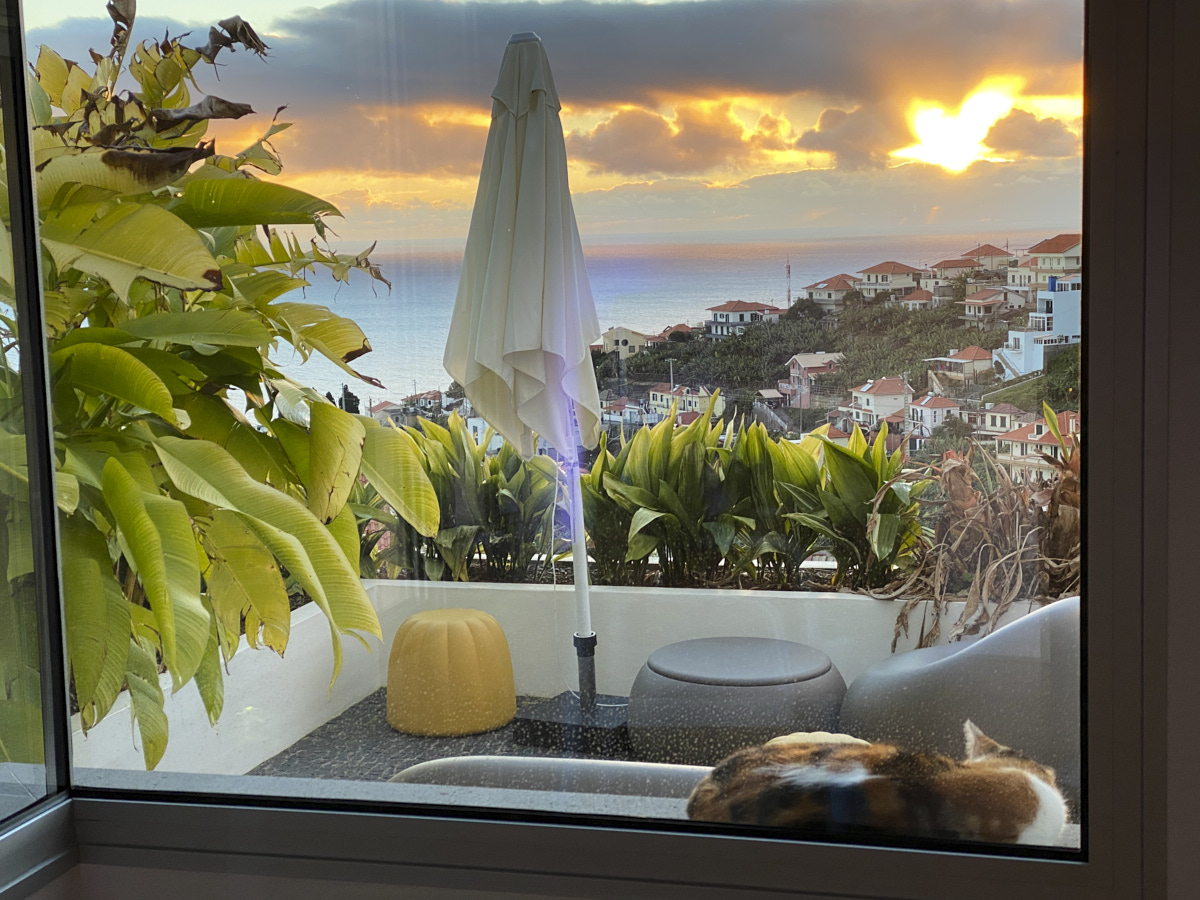
The new house has some quiet roads that wind up the hills to the North. About a 5 mile round trip, with about 1600 feet of elevation gain. (8km, 480m) The picture below shows an old house with vines growing on it. A number of the building have iron frameworks over their tile roofs, often extending into a large pergola, with vines growing on them. I’m not sure if this is to keep the roof cooler during the summer? Below, a neighborhood cat is sleeping on a hammock of vines. Beyond is the view over the valley, with all the small terraced gardens. They have extensive irrigation canals called levadas, and these are nice, relatively flat trails for walking. The levada’s can be diverted through a system of small canals to any of the terraces below.
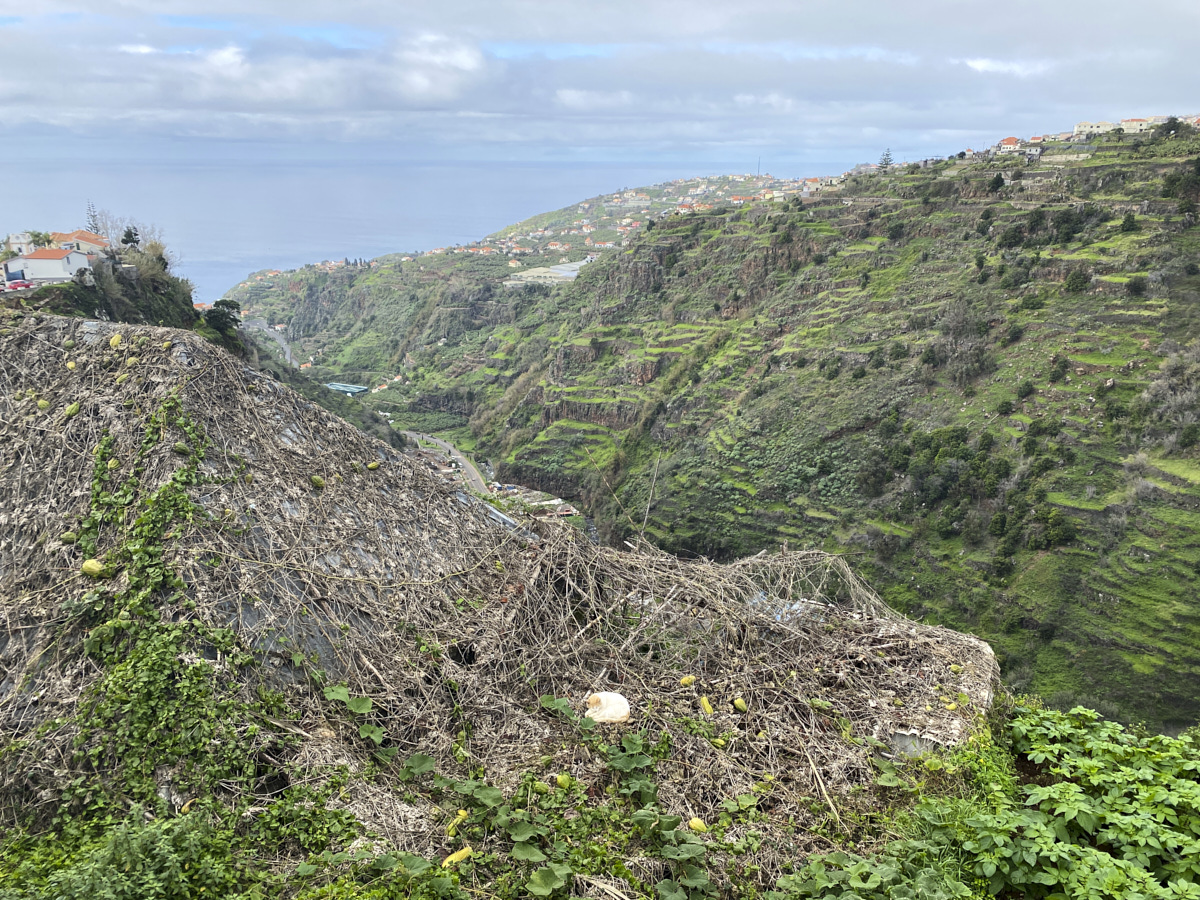
A picture from our second house area, with a poinsettia shrub in full bloom.

And this is the view of our second house. A very traditional style for Portugal, with green shutters, 5 balconies and a courtyard. We enjoyed our stay here, but do prefer a more modern style with more windows.
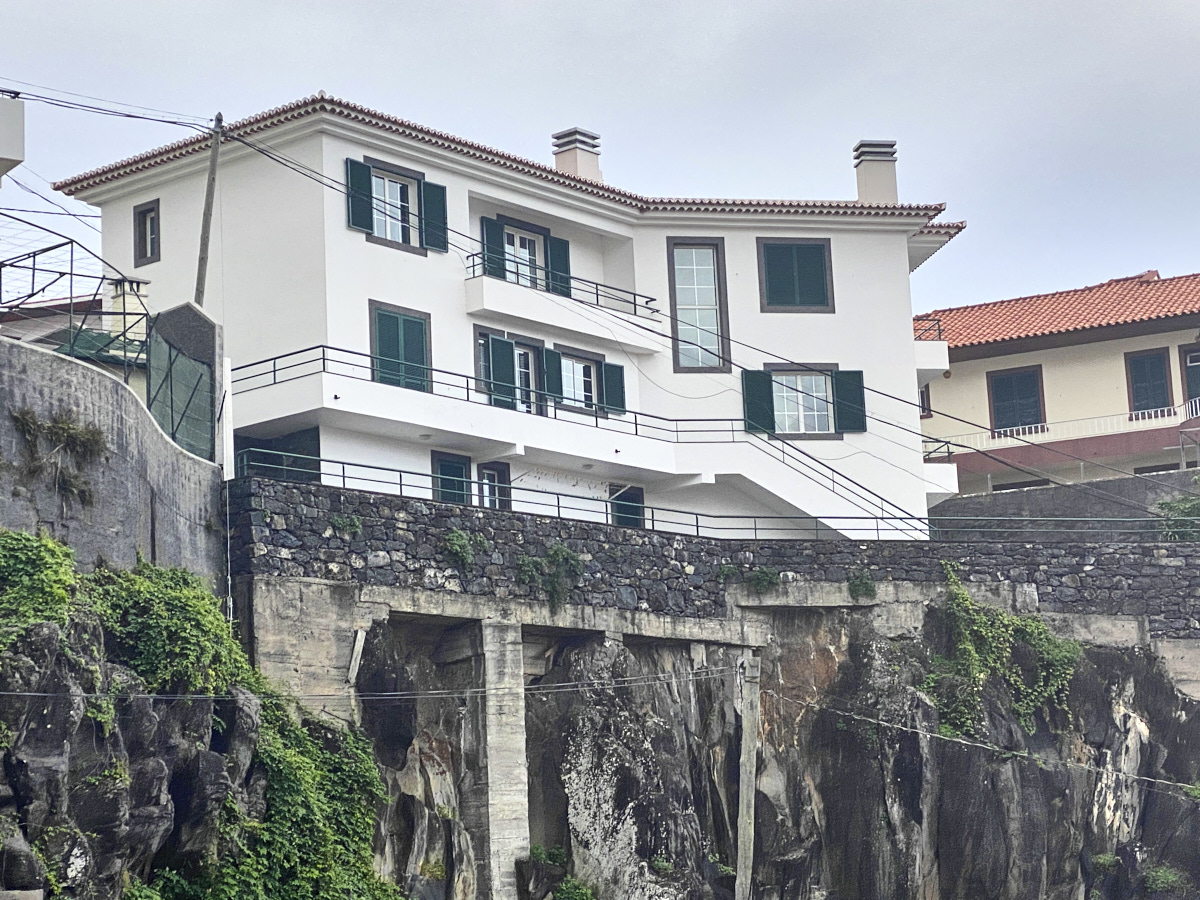

And lastly, closer view of one of the gardens overlooking the valley. In Madeira, gardening can be a contact sport if you’re not careful of the edges!
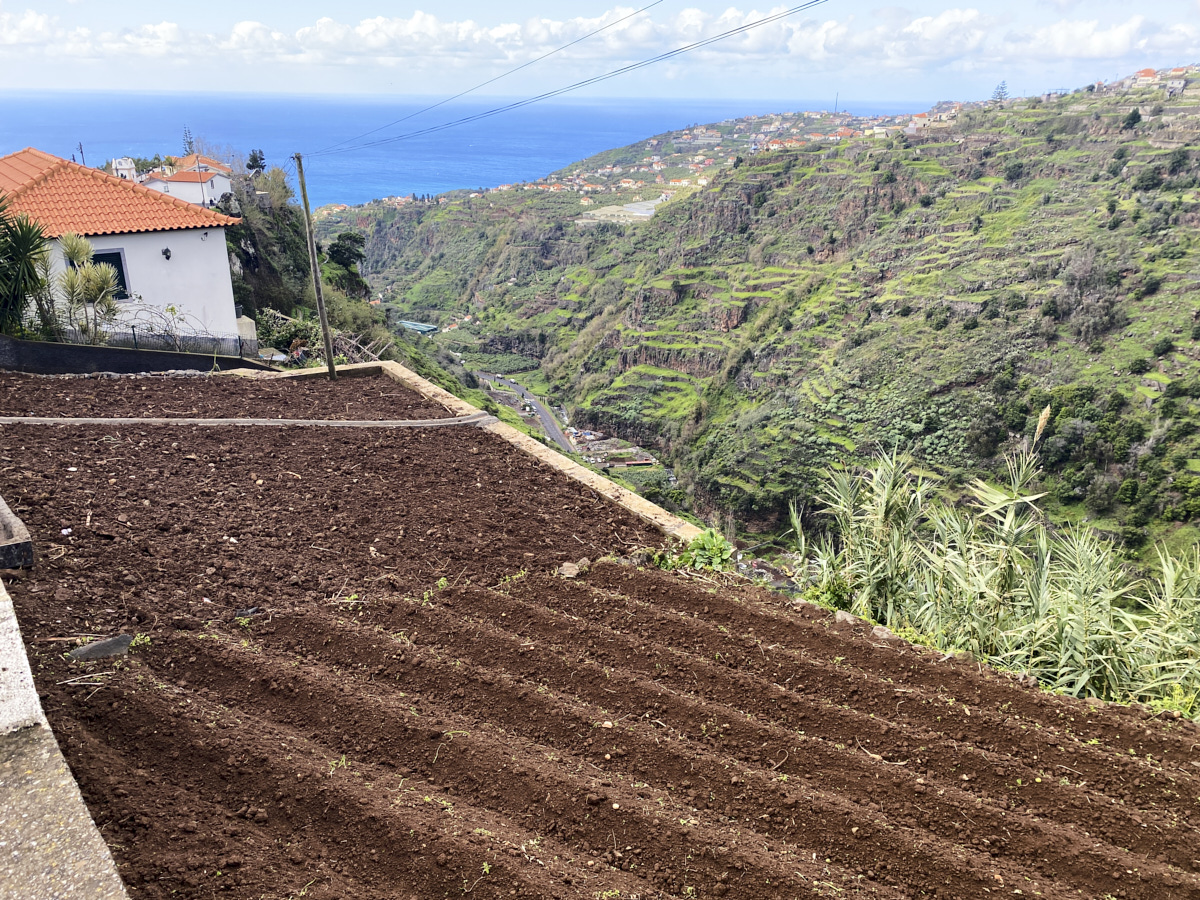
Bye for now,
Tim and Deb

